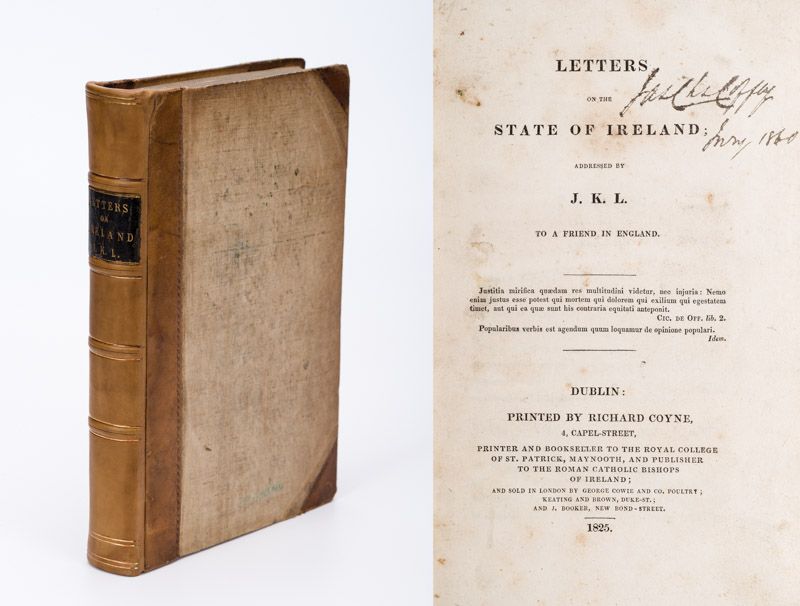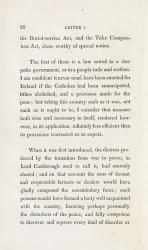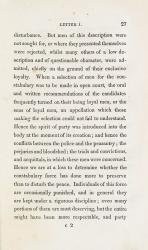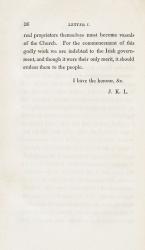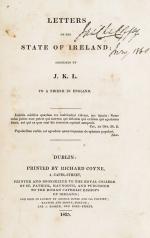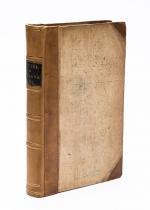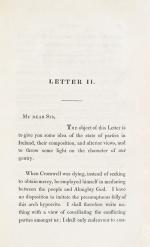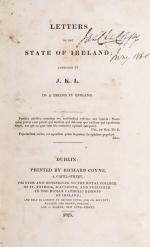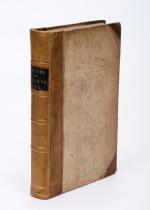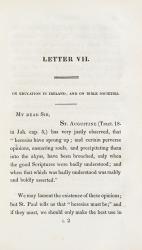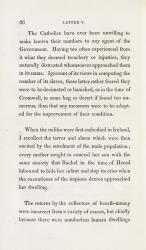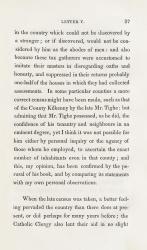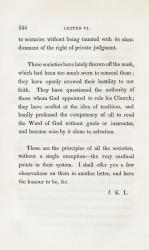[Doyle, Letters on the State of Ireland - Addresses by J.K.L. to a friend in Eng
Letters on the State of Ireland – Addresses by J.K.L. to a friend in England [With a section: “Administration of Justice and Spirit of the Penal Laws”].
First Edition. Dublin, Printed by Richard Coyne [Printer and Bookseller to the Royal College of St.Patrick, Maynooth, and Publisher to the Roman Catholic Bishops of Ireland], 1825. Octavo (15 cm x 21 cm). VIII, 364 pages. Hardcover / Recently restored and rebacked original binding. Excellent condition after the restoration. From the library of Judge James Charles Coffey, with his name signed on the titlepage and dated May, 1860. Some mild foxing to first 10 pages, otherwise very good. Extremely rare publication !
Letters include topics like: “The Character of the Irish Government, and the effect of its measures upon the Country; including remarks on the Peace-preservation Act, or Constabulary Bill, the Burial Service Bill and the Tithe Composition Act / The State and Composition of Parties (Sketch of the Irish Gentry) / The State of Religion and the Character of its Ministers in Ireland / The Administration of Justice and Spirit of the Penal Laws / The Increase of Population – its causes and effects, prevailing errors on this subject / Public Education and to whom it should be intrusted / The Bible Societies – Their Opposition to the interests of Religion and Peace in Ireland / On Catholic Emancipation – On the Papal Power and the Nature of Allegiance and on the Oath and Declaration taken or made by Protestants of the Established Church / On the Disenfranchisement of the Forty-Shilling-Freeholders – How unjust and injurious such a measure would be / On a legal Provision for the Poor – Its practicability and advantages to all classes in Ireland, but especially to the Government //
James Warren Doyle, O.E.S.A. (1786–1834) was a Roman Catholic Bishop of Kildare and Leighlin in Ireland, who used the signature “JKL”, an acronym from “James Kildare and Leighlin.” Doyle was active in the Anti-Tithe movement. A campaigner for Catholic Emancipation up to 1829, he was also an educator, church organiser and the builder of Carlow cathedral.
Doyle was born close to New Ross, County Wexford in 1786, the posthumous son of a respectable farmer; his mother (Anne Warren, of Quaker extraction) was living in poverty at the time of his birth. At the age of eleven he witnessed all the horrors of the Battle of New Ross between the United Irishmen and British Crown forces supplemented by the militia and yeomanry. He received his early education at Clonleigh, at Rathconrogue at the school of a Mr. Grace, and later at the Augustinian College, New Ross under the care of an Augustinian monk, Rev. John Crane.
Doyle joined the Augustinian friars in 1805 at Grantstown, County Wexford and then studied for his doctorate at Coimbra in Portugal (1806–08). His studies were disturbed by the Peninsular War, during which he served as a sentry in Coimbra. Later, he accompanied the British Army with Wellington’s forces to Lisbon as an interpreter.
Following Doyle’s return to Ireland, he was ordained to the priesthood on 1 October 1809, at Enniscorthy. He taught logic at the Augustinian College, New Ross. In 1813, Doyle was appointed to a professorship at Carlow College, holding the Chair of Rhetoric and in 1814, the Professorship of Theology.
Michael Corcoran, Bishop of Kildare and Leighlin, died on 22 February 1819. Doyle was a popular choice of the clergy and bishops of the Archdiocese of Dublin and was chosen by the Holy See as Corcoran’s successor. He was formally named in August 1819 and was duly consecrated in Carlow Parish Church on 14 November. During his fifteen-year tenure as Bishop of Kildare and Leighlin, Doyle earned respect nationwide for his polemics in furtherance of the Catholic position in both Irish and British society, and in supporting the work of the Catholic Association. His books on pastoral, political, educational and inter-denominational matters provide a rich source of material for social and religious historians (see below). He was a close ally of Daniel O’Connell in the political campaign for Catholic Emancipation which was finally passed in 1829 by the Wellington government.
Tithe – War: In 1830, the new tithe-proctor of Graigue (a parish of 4,779 Catholics and 63 Protestants) decided to break with the tradition of his predecessor and to enforce seizure orders for the collection of arrears of Tithes. Tithes provided financial support of the established Anglican Church of Ireland. Some of the recalcitrant Catholics had habitually transferred ownership of their livestock to Doyle in order to avoid seizure at the town fair. The new proctor requested their priest’s cooperation in handing over the assets. Doyle refused, and the proctor, aided by the Irish Constabulary, seized some of the livestock. A mass riot broke out at the fair and there were several casualties. A civil disobedience campaign followed, peppered with sporadic violence mostly at country fairs over the seizure of livestock. A period of instability that would become known as the Tithe War followed.
Doyle was a leader of nonviolent resistance to the Tithe, devoting himself both to strengthening the nonviolent resistance and to discouraging like paramilitary secret societies who had taken to using violence to drive out tithe-collectors and to intimidate collaborators. He said: “I maintain the right which [Irish Catholics] have of withholding, in a manner consistent with the law and their duty as subjects, the payment of tithe in kind or in money until it is extorted from them by the operation of the law.”
Given Doyle’s prior experience in education, his major contribution was arguably in helping the establishment of National Schools across Ireland from 1831, the initiative of Edward Stanley, Chief Secretary of Ireland, which were initially started with a U.K. government grant of £30,000. The proposed system was ahead of state provision for education in England or Scotland at that time. This Model School prototype was, in some respects, experimental. His involvement is a sign of his practicality and foresight. He told his priests:
“…all the teachers henceforth to be employed be provided from some Model School, with a certificate of their competency, that will aid us in a work of great difficulty, to wit, that of suppressing hedge schools, and placing youths under the direction of competent teachers, and of those only″
Doyle spoke before a Parliamentary Committee as follows:
“I do not see how any man wishing well to the public peace, and who looks to Ireland as his country, can think that peace can be permanently established, or the prosperity of the country ever well secured, if children are separated at the commencement of life on account of their religious opinions″
This is how he sees it from a political point of view. Separate schools would endanger the public peace, which is not yet permanent. The prosperity of the country also depends on keeping children together. Then he deals with the effect of separation on the children themselves.
“I do not know of any measures that would prepare the way for better feeling in Ireland than uniting children at an early age, and bringing them up in the same school, leading them to commune with one another and to form those little intimacies and friendships which subsist through life. Children thus united know and love each other as children brought up together always will and to separate them is I think, to destroy some of the finest feelings in the hearts of men″
Doyle made statements on other issues: the theological status of ‘non-Catholic’ Christians; freedom to convert to Protestantism, mixed marriages and, as already mentioned, on the union of Catholics and Anglicans. We know now that on this last issue he was asked to resign by Rome and was eventually allowed to continue after agreeing not to speak on the issue again.
The construction of Carlow Cathedral of the Assumption crowned Doyle’s career, being started in 1828 and finished at the end of November 1833. Doyle fell ill for a number of months before dying on 15 June 1834. He was buried in his new cathedral. A sculpture, by John Hogan, in memorial to Doyle was finished in 1839.
Several biographies were written on Doyle before 1900 and his influence on the later Irish Catholic bishops in the period 1834-1900 was considerable. He had proved that negotiations with government could be beneficial to his church, his congregation, and its finances.
Works of Doyle:
- A Vindication of the religious and civil principles of the Irish Catholics (1823)
- Letter on the state of Ireland (1825)
- An essay on the Catholics claims (1826)
- Letter to Thomas Spring Rice, Esq. M.P. &c: on the establishment of a legal provision for the Irish poor, and on the nature and destination of church property (1831) (Wikipedia)
- Keywords: Anti-Tithe movement · Catalogue Irish History Six – General Irish History · Catalogue Irish History Three – From Famine to Free State · Catalogue Irish History Two – Origins of Irish Identity · Catalogue One – History of Law · Catholic Church in Ireland · Catholic Emancipation · Irish Education · Irish History · Irish History – Rare · Irish History in the 19th century · Irish History of Education · Irish History of Law · Irish Law · Irish Legal History · James Charles Coffey Library · Law · Law – Rare · Poor Law · Poor laws · Poor Relief · Tithe-War
- Language: English
- Inventory Number: 29464AB
EUR 280,--
© 2026 Inanna Rare Books Ltd. | Powered by HESCOM-Software




